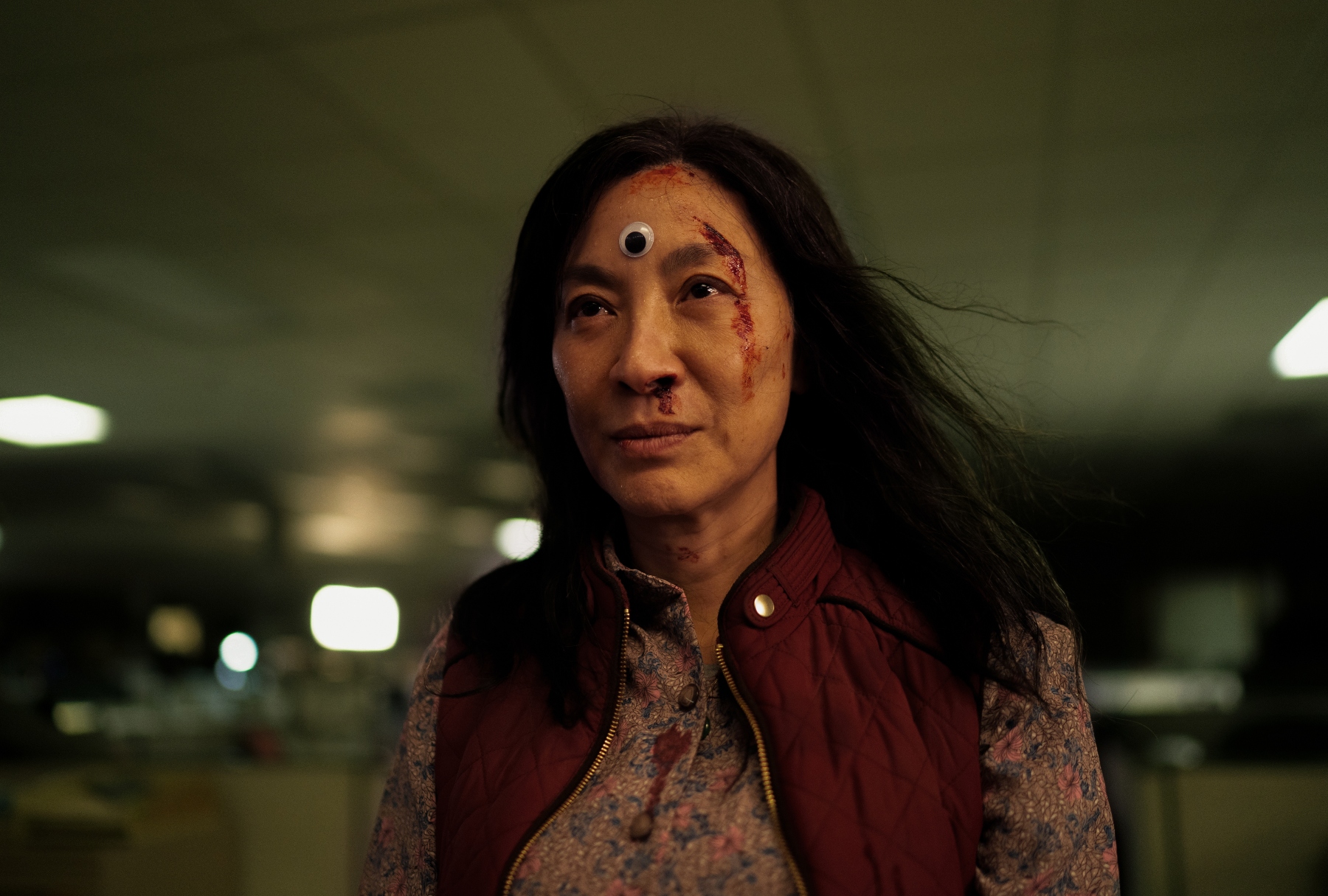Plato. Hegel. Hawking. And now . . . Daniels?
It takes someone rather bold or foolish – or both – to not only try to create a Theory of Everything, but also state that is their intention. But that’s precisely what directing duo Dan Kwan and Daniel Scheinert – collectively known as Daniels – have done with their genre-busting, indie adventure family film featuring bagels and martial arts, “Everything Everywhere All at Once.”
The wild, profane and wholly heartrending film is about a middle-aged woman, Evelyn Wang (Michelle Yeoh), who runs a struggling laundromat with her sweet husband Waymond (Ke Huy Quan). It’s also about immigrant disappointment. And multiverse jumping to show Evelyn what her life could’ve been as a badass martial artist or opera singer. And placating Gong Gong (James Hong) or the scary tax lady (Jamie Lee Curtis). And alienating her grown daughter Joy (Stephanie Hsu). And becoming so overwhelmed with what’s happening in the world that nothing matters. And rocks. And love.
In short, it’s a lot. Or indeed, everything.
On the day their movie released wide, the Daniels tweeted out a lengthy statement about their process, giving thanks to all who helped their multiverse action comedy come to life. Take a look:
Writing “Everything Everywhere All at Once” was a foolish prayer to a cold, indifferent universe. It was a dream about reconciling all of the contradictions, making sense of the largest questions, and imbuing meaning onto the dumbest, most profane parts of humanity. We wanted to stretch ourselves in every direction to bridge the generational gap that often crumbles into generational trauma. It was an attempt to create the narrative equivalent of the Theory of Everything. A Big Data approach to myth-making. A post-genre deconstruction of traditional narrative. A maximalist’s manifesto for surviving in the noise of modern life. And holy shit, these two clowns named Daniel were not up for the challenge.
Against all odds, including “creating a film that tried to touch infinity but with the budget of a rom-com,” that’s exactly what they’ve achieved. The film has earned rave reviews and strong word of mouth. It’s touched the Asian American community in addition to the wider moviegoing audience who cannot deny its artistic mastery, goofy humor and emotional appeal. It’s inspired GIFs, memes, movie poster spoofs and no doubt many, many upcoming Halloween costumes featuring floppy hot dog fingers and googly eyes.
“Everything Everywhere All at Once” is a follow-up to the Daniels’ 2016 film “Swiss Army Man,” which is a two-hander of sorts starring Paul Dano as a man stranded on a desert island who befriends a flatulent corpse played by Daniel Radcliffe. It was a rather dark cult fave, to say the least. More broadly popular was their raucous music video for DJ Snake and Lil Jon’s “Turn Down for What,” which became a viral sensation for starring Kwan and his destructive penis.
While irreverence and the unexpected seem to be the Daniels’ trademarks, the biggest hint of their interest in tackling life, the universe and everything can be found in their 2016 short film, “Interesting Ball.” Amid the many bizarre scenes in the film – such as Scheinert getting absorbed into Kwan’s butt and adultery with a red rubber ball – is this line: “If the universe is as infinite as they say that it is, then these weird things that are happening aren’t just possible, they’re inevitable.”
Inevitable, just like Evelyn being fated to save the universe because she’s the least successful of all the multiverse Evelyns. She is the least likely, and therefore the one that is perfect. The least likely actions are also what allows her to access the skills from the other Evelyns.
Want a daily wrap-up of all the news and commentary Salon has to offer? Subscribe to our morning newsletter, Crash Course.
Knowing that I only had 20 minutes to chat with the Daniels, I decided to also go with the least likely questions. Everyone’s already written about the big topics; why not go small and personal instead? And naturally, the Daniels made the most of the questions about moms, fanny packs and butts.
The following interview is edited for length and clarity.
“Everything Everywhere All at Once” is one of those films where I really felt seen – and it wasn’t just because it features an Asian American immigrant woman – but the concept of feeling overwhelmed really hit home for me. I’ve suspected for a while, and a lot of my friends have been encouraging me to get diagnosed for ADHD. And so watching it, I wondered, “How is this film exactly what I feel?” Was there any of that influence in the film?
Dan Kwan: That’s amazing. When we first started writing this movie, we knew we wanted to make a movie about chaos and about this overwhelming feeling that everyone’s been feeling the past six years. Or 34 years. Or all throughout history of mankind. But when we started writing, we were like, “Oh, we should probably do a little bit of research about ADHD. Maybe the main character is undiagnosed and they don’t know it.”
Daniel Scheinert: Yeah, we were like, “Maybe she’s so distractible, she can go to other universes with her brain.” But then we’re like, “That might be offensive. We should Google it.”
“This movie, obviously, when you look at it now, was made by someone with ADHD.”
Kwan: So I started doing some research. And then I stayed up until like, four in the morning, just reading everything I could find about it, just crying, just realizing that, “Oh, my God, I think I have ADHD.” So this movie is the reason why I got diagnosed. I got diagnosed, I went to therapy for a year and then went to a psychiatrist. And I’m now on meds, and it’s such a beautiful, cathartic experience to realize why your life has been so hard.
This movie, obviously, when you look at it now, was made by someone with ADHD. And it’s just funny how many people have come up to me after screenings and said, “This feels like you’re in my brain.” And some of them are people like yourself who suspect that they have ADHD and then other people who recently got diagnosed because I think during the pandemic, a lot of people have been struggling in this new version of life, where there is less structure because ADHD people need structure, otherwise we fall apart. And so, I love the fact that this movie can become a cathartic expression of me realizing this but then also can be a way for people to talk about it in their own lives.
RELATED: Parents were stuck inside with their kids. A rise in ADHD diagnoses soon followed
And it makes sense if you do have ADHD and weren’t diagnosed because Asian immigrants don’t care about that stuff. And then also, women historically have been way underdiagnosed because they weren’t expressing their ADHD in the same way that men were or boys were. I have a lot of female friends who have within the past three or four years got diagnosed. And it’s life-changing.
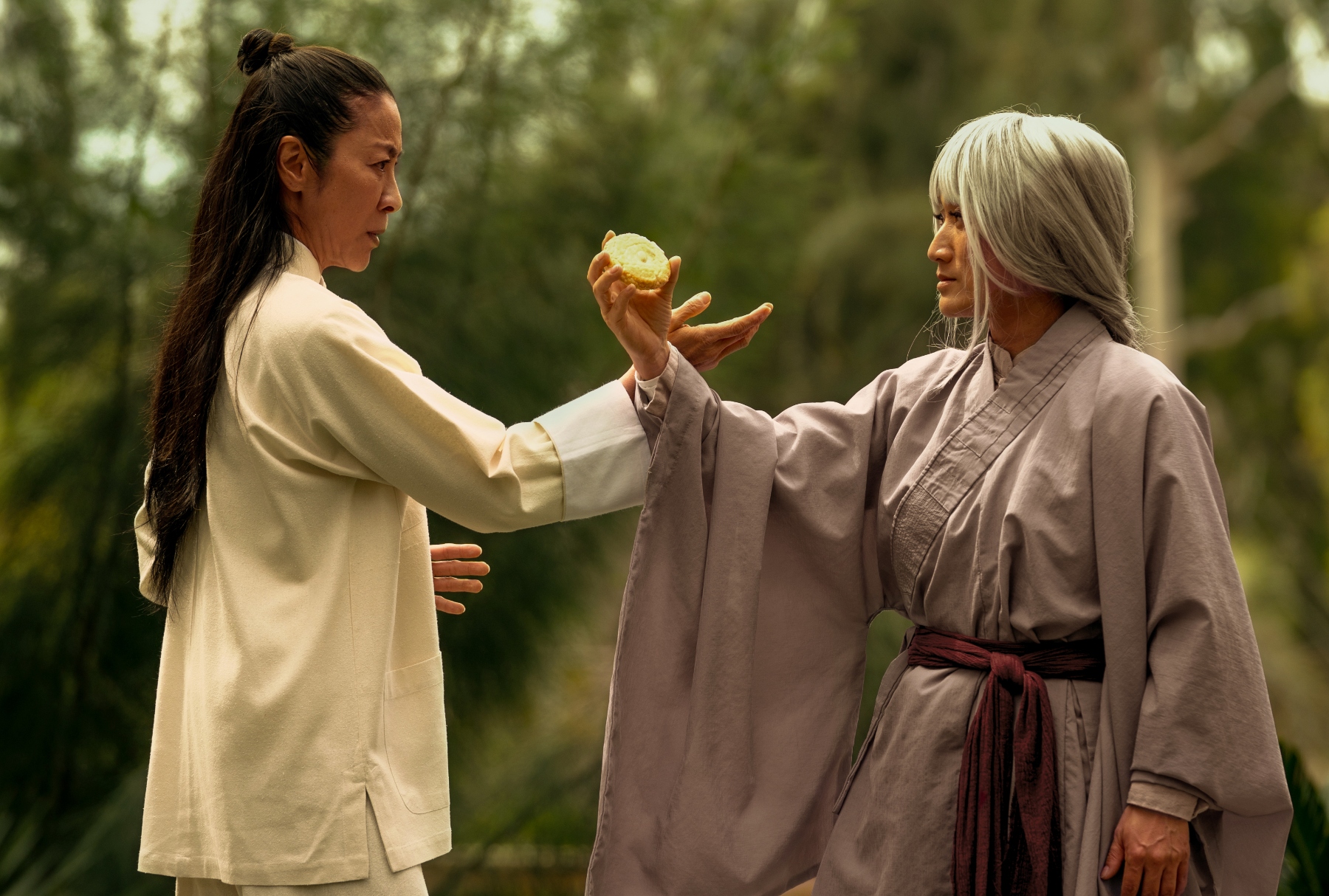 Michelle Yeoh and Jing Li in “Everything Everywhere All at Once” (Allyson Riggs/A24)
Michelle Yeoh and Jing Li in “Everything Everywhere All at Once” (Allyson Riggs/A24)
My friends and I joke that the production company A24, the A stands for friend to Asians or Allies 24, whichever we want to call it because of them producing “The Farewell,” “Minari,” “Moonlight,” etc. You’ve done such a range of projects in the past, so why did you feel that now is the time to make this film, one that is centered on an Asian American family? And featuring Asian film nods (Wong Kar-wai, martial arts tropes)?
Kwan: It was completely an accident. We just started writing this movie almost six years ago. And at that time, I was like, “I think I’m ready to start putting myself in this movie, my cultural heritage in this movie in a more overt way.” It’s very funny, actually. I was at an Asian American mixer many years ago. And I was with a bunch of Asian American men in a circle. We were just talking and one of them kind of turned to me and was like, “This might sound weird, but I look at ‘Swiss Army Man,’ and I know it’s two white guys in the woods, but I look at that movie and I’d see an Asian American storyteller because that’s what the Asian American male experience has been up until this point. It’s been one of isolation and an inability to love yourself.’ So anyways, he said this out loud, and all the other Asian American dudes were like nodding. They were like, “Yeah, I totally see that.” Conversations like that made me realize, “Oh, I really need to just be way more overt about this.” I am so lucky to have this platform that we have to be filmmakers to get to do whatever we want, in some ways. And it just happened that we took so long to make the movie that by the time the movie was done, the world was ready for Asian American-led sci-fi movies. So it was totally chance.
Scheinert: Yeah, I don’t know if this is like a punchy story to tell. In some ways, a lot of our ideas start off kind of low brow and intuitive, and so this started off as just an action movie concept of like “verse jumping” and fighting. And then we talked about our favorite action movies and a lot of them were like, Hong Kong-style kung fu movies. And then we were like, “Oh, who could we cast in our movie?” So it started off not about the Asian American experience, but “What if we could get Jackie Chan or Michelle Yeoh or Stephen Chow to be in our movie? Wouldn’t that be cool?”
“A lot of our ideas start off kind of low brow and intuitive.”
And then it was almost like, as we wrote it, it was like, “Oops, this is getting more and more personal, the further we go.” Which is like how a lot of our process is. We start with an image or a joke, and then we start digging in, and then both of us will be like, “Oh, no, this is getting personal. That joke resonated for this personal reason. I think now this movie is becoming about this thing I’ve been working through.” So it was a miracle, because like, it’s been so beautiful to watch it resonate with people and yeah, therapeutic to work on.
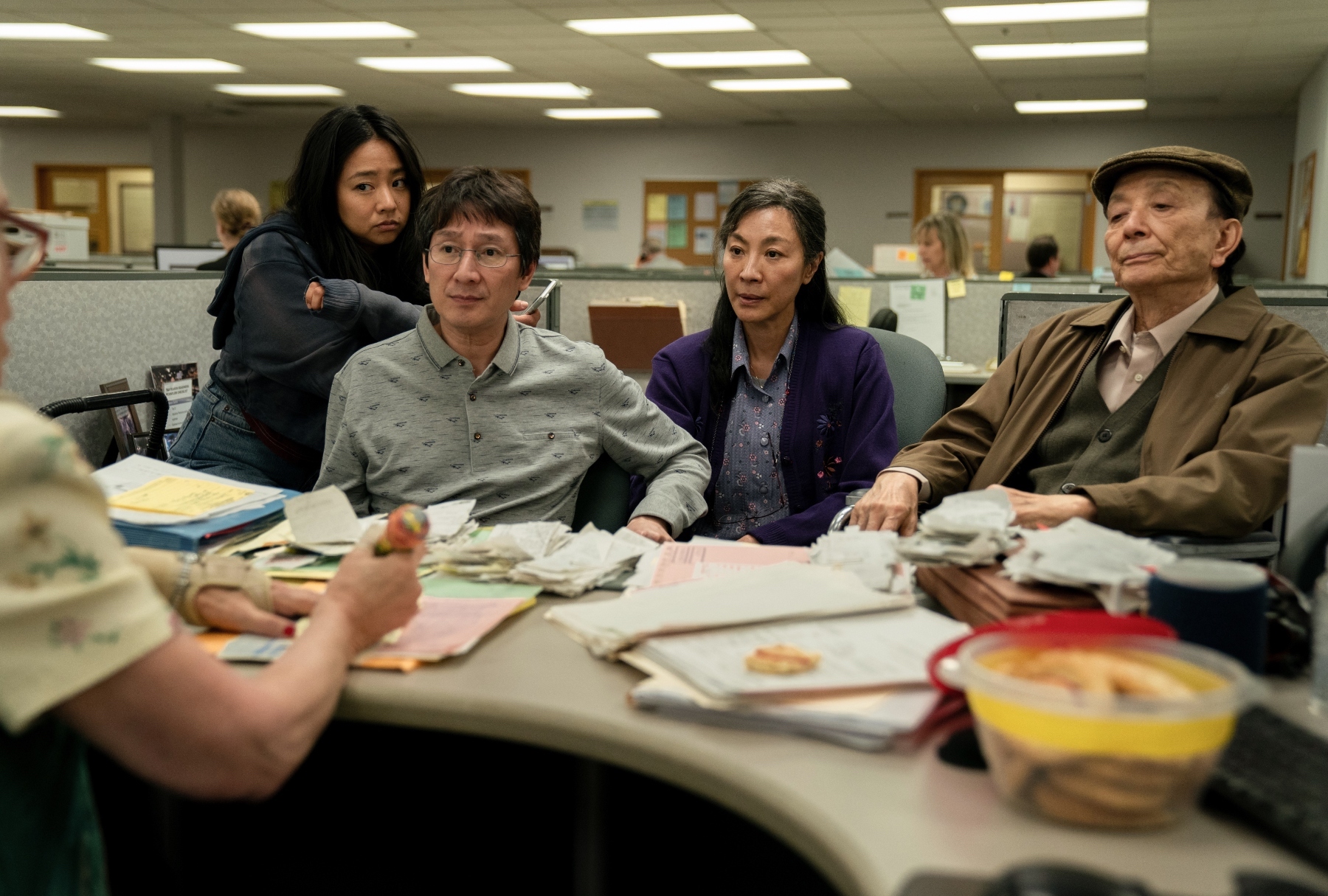 Stephanie Hsu, Ke Huy Quan, Michelle Yeoh & James Hong in “Everything Everywhere All at Once” (Allyson Riggs/A24)You talked about the Asian American man’s experience, the gendered socialization that is the loneliness with “Swiss Army Man.” Since you were thinking of having a man – Jackie Chan or Stephen Chow – as the lead, when you eventually flipped the genders to have Michelle Yeoh be a lead, how did that open up or change the story for you when it came to her relationships and how you expressed Evelyn?
Stephanie Hsu, Ke Huy Quan, Michelle Yeoh & James Hong in “Everything Everywhere All at Once” (Allyson Riggs/A24)You talked about the Asian American man’s experience, the gendered socialization that is the loneliness with “Swiss Army Man.” Since you were thinking of having a man – Jackie Chan or Stephen Chow – as the lead, when you eventually flipped the genders to have Michelle Yeoh be a lead, how did that open up or change the story for you when it came to her relationships and how you expressed Evelyn?
Kwan: Yeah, honestly, what it became was a movie about our moms. And suddenly, there is so much to say about that, specifically when it comes to – this is a story about family trying to reach out to each other and see each other in the chaos, in the noise of modern life. Once I put my mom in that position, everything made so much more sense because I know my mom has a deep well of love for all her children. But she has a funny way of showing it. And so to watch someone like that go through this journey felt so much more powerful and so much more nuanced in a way that was harder to imagine with a male character.
Scheinert: Yeah. Was it your wife that said that our first movie was about the self? And this was about family?
Kwan: Yeah, this is our conversation after. The first movie was about reconciling with the self. This was about reconciling the family and the community.
Scheinert: We just started thinking about our families and having so many interesting conversations. And so like, I think Joy, Waymond, Evelyn and Gong Gong are all these amalgamations of so many stories of cousins, aunts, uncles, brothers, sisters, grandparents. It was like a really fun you know, canvas.
Kwan: The last thing I’ll say is Asian American or Asian immigrant mothers, they’re such a unique glue or gravity to a family unit, because they’re the ones who are holding it all together in this very invisible way. They have to have their fingers on everything. The multiple jobs they’re working on, all the children that they’re working with, they have to feed the husband, they have to clean the house. Basically we took someone who was already living in chaos and then put them into the multiverse chaos, which I think was a really elegant fun thing to throw that character into. So yeah, it just all started to click and make sense, it was way easier to write.
“Asian immigrant mothers, they’re such a unique glue or gravity to a family unit, because they’re the ones who are holding it all together in this very invisible way.”
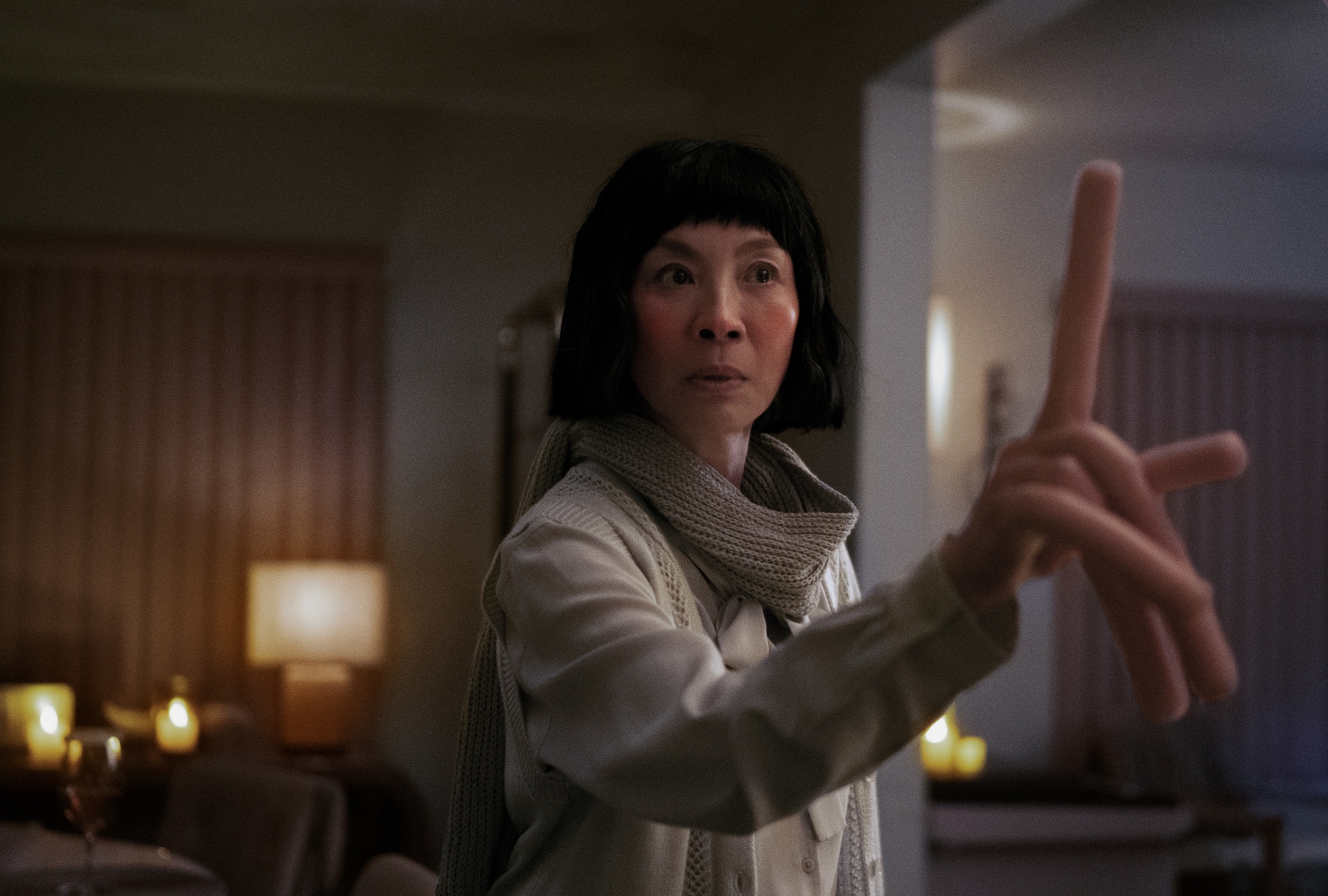 Michelle Yeoh in “Everything Everywhere All at Once” (Allyson Riggs/A24)Michelle Yeoh, of course this is the perfect vehicle for because she can do it all: action, comedy, drama. But at the same time, once you got her, was it the sky’s the limit of what you decided you could throw at her? Or was there something that you were like, “No, we can’t ask her to do that,” or just ended up getting scratched off a list?
Michelle Yeoh in “Everything Everywhere All at Once” (Allyson Riggs/A24)Michelle Yeoh, of course this is the perfect vehicle for because she can do it all: action, comedy, drama. But at the same time, once you got her, was it the sky’s the limit of what you decided you could throw at her? Or was there something that you were like, “No, we can’t ask her to do that,” or just ended up getting scratched off a list?
Scheinert: When we when we approached her, we had a full screenplay, which is pretty scary, because we’d already spent a long time on it. And a lot changed, but a lot of the beats were the same. And so we thought it was gonna be a lot harder to convince her to do a lot of the weird stuff in the movie. But I remember when we met her, we asked her if she’d seen anything lately that she liked, so that we could kind of be like, “oh, yeah, I like that movie, too.” And she was like, “I really liked ‘Deadpool 2.'” And we were like, “Oh, my God, this is gonna be an easier sell. If you like that movie, then our movie’s not that weird.”
Kwan: And I think she went into that meeting thinking that she would convince us to cut the hot dog fingers out because she didn’t understand it. But then she asked us about the hot dog fingers, and I don’t remember what we said but I guess we convinced her of it.
Scheinert: She at least was like, “Maybe I’ll bring it up later,” and then she forgot. Then once Jamie [Lee Curtis] came on board – mostly because Jamie wanted to work with Michelle – then it was almost like a competitive thing where both of them would be like, “Alright, I’m going to do something pretty weird.” And then be like, “OK, your turn, you have to do that thing that those little boys came up with.” And they’d make fun of us, but they trusted us and took such risks.
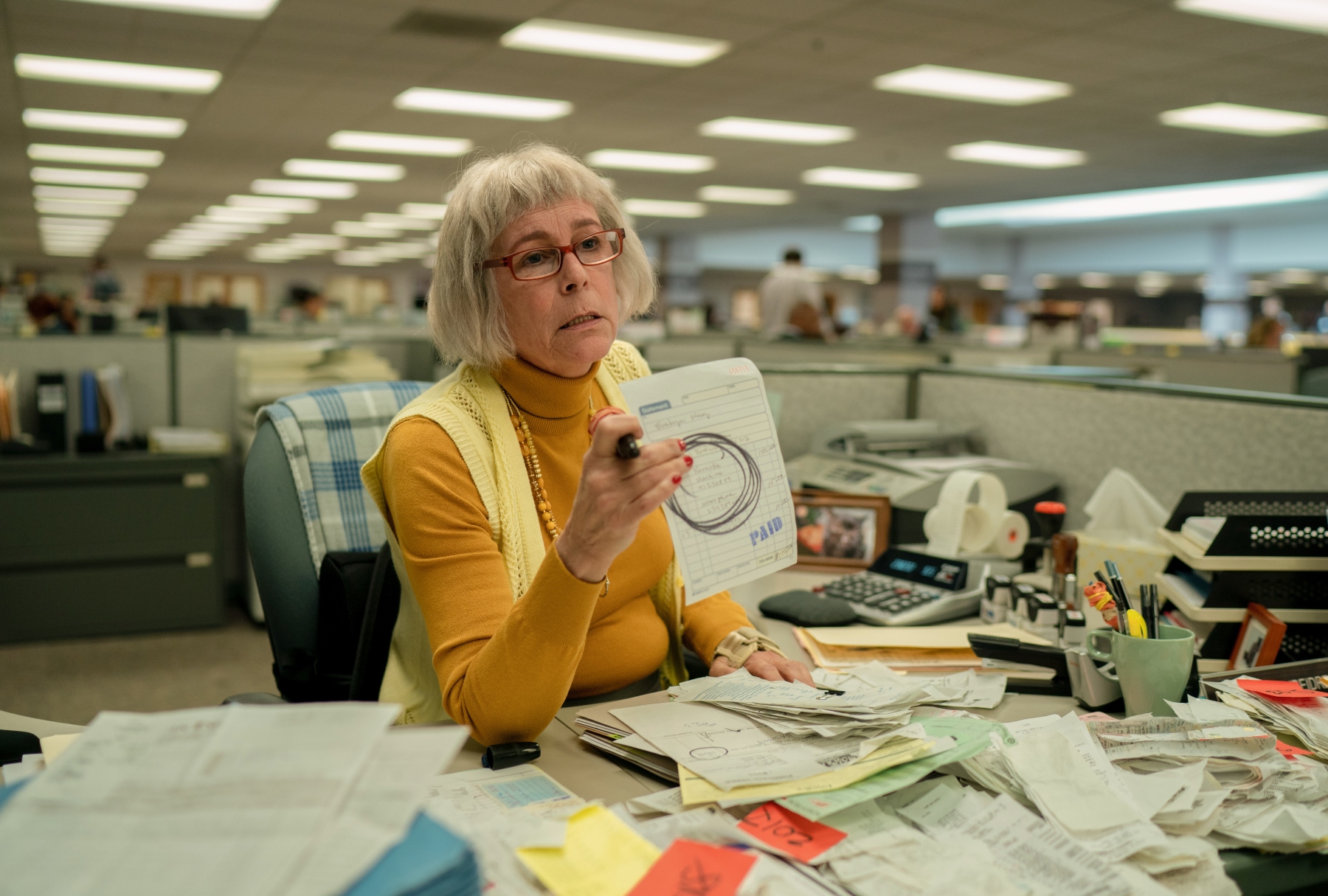 Jamie Lee Curtis in “Everything Everywhere All at Once” (Allyson Riggs/A24)But they’re both rocking the vests I gotta say. One of my favorite things are the looks in this film and probably not the glam ones.
Jamie Lee Curtis in “Everything Everywhere All at Once” (Allyson Riggs/A24)But they’re both rocking the vests I gotta say. One of my favorite things are the looks in this film and probably not the glam ones.
Scheinert: Yeah, Shirley Kurata was our costume designer. And she does a lot of glam and does a lot of like, really off-the-wall styling for pop artists. But she also has such a deep love for authentic, everyday people. She got really excited to explore Chinatown for shoes and vests and necklaces that you could only find there.
Kwan: I don’t know if you remember, it was the red “Punk”-[embroidered] sweater that she wore from the Chinese New Year party.
Scheinert: She was like, “This is a one of a kind. I found it somewhere, I don’t know where to find another one ever again.”
Kwan: It’s so funny. I love that. It’s exactly the kind of thing my mom would wear, not knowing what it says.
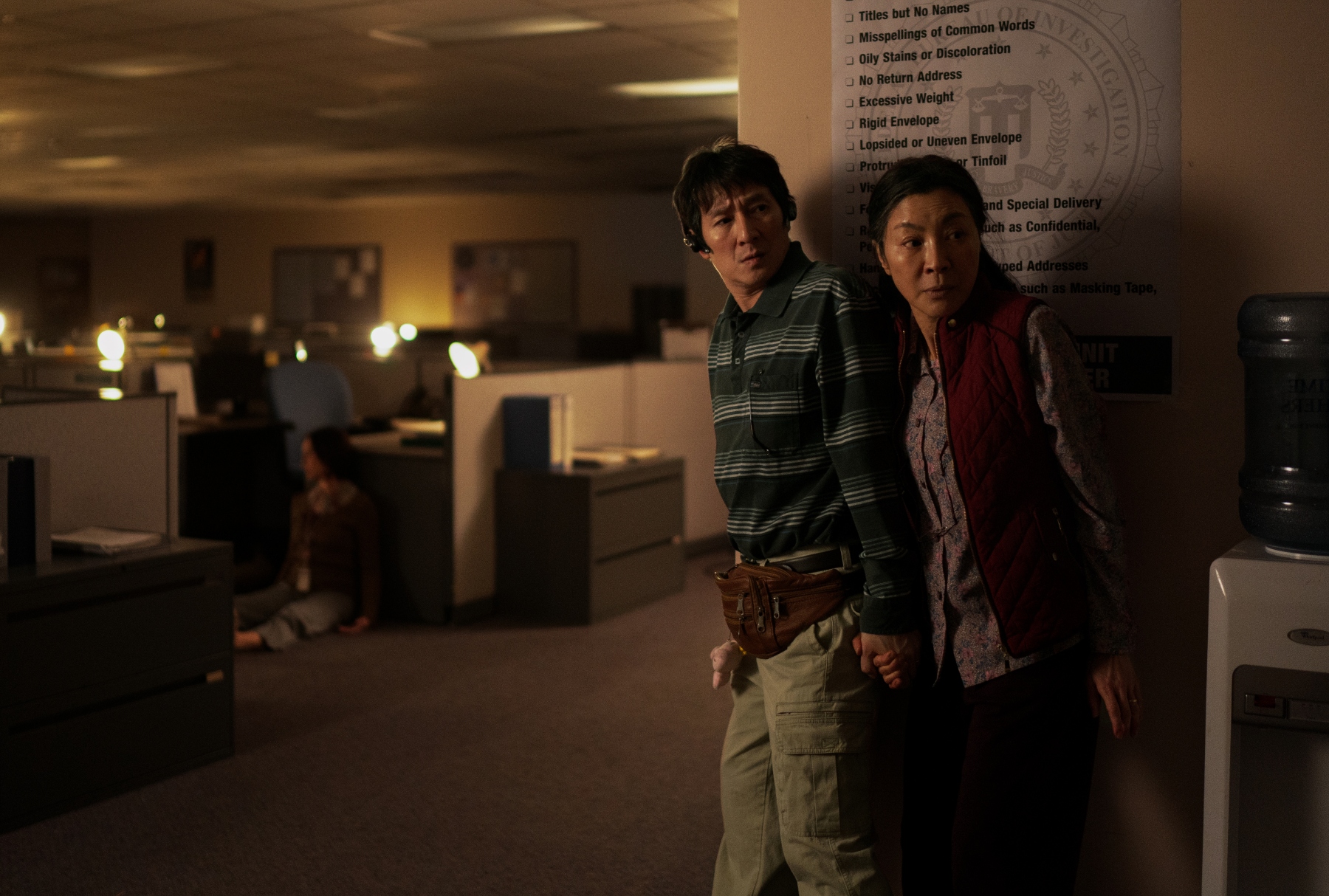 Ke Huy Quan and Michelle Yeoh in “Everything Everywhere All at Once” (Allyson Riggs/A24)Exactly. I remember thinking that. Also, was there a discussion about what kind of fanny pack that Waymond would be wearing?
Ke Huy Quan and Michelle Yeoh in “Everything Everywhere All at Once” (Allyson Riggs/A24)Exactly. I remember thinking that. Also, was there a discussion about what kind of fanny pack that Waymond would be wearing?
Scheinert: Yeah, we went through a lot of talks. And we wanted something that had impact, like leather was like, “Ooh, that could slap.”
Kwan: Also like traditionally, when you go to Disneyland, you see all the Asian American tourist dads, my dad included – a lot of leather fanny packs. Usually black leather, for my dad, but we knew visually black leather would get lost in the fight scenes. So we went with brown leather, and we added a cute little keychain to help.
Scheinert: Whereas if it had been about my family, it would have been more of like a nylon fanny pack. My dad was more into like neon-colored hats and fanny packs.
Kwan: Very ’80s.
So, what I thought was interesting, was that basically Evelyn’s superpower – why she’s chosen – is that she failed at everything. And Waymond’s is he’s very kind, he’s very loving. These are very accessible. What do you think your superpowers would be?
“I’m a Machiavellian string-puller. You’ll never feel the strings getting pulled because I’m so gentle.”
Scheinert: I think, full circle, Kwan, his ADD is his superpower as well. Like, I’m in awe sometimes of the hyper-focus on a thing and to be able to just sit and work on a scene editorially or in the screenwriting phase and forget to eat dinner because you’re like cracking a real puzzle, you know?
Kwan: And then Scheinert’s superpower is he’s a very good collaborator or he understands how to produce and edit and kind of move around things without crushing it or overhandling it. Like, if you overhandle sushi, it’s not good. Some ideas you shouldn’t overhandle. And so Scheinert is a serial collaborator. He’s very good at that.
Scheinert: I’m a Machiavellian string-puller. You’ll never feel the strings getting pulled because I’m so gentle.
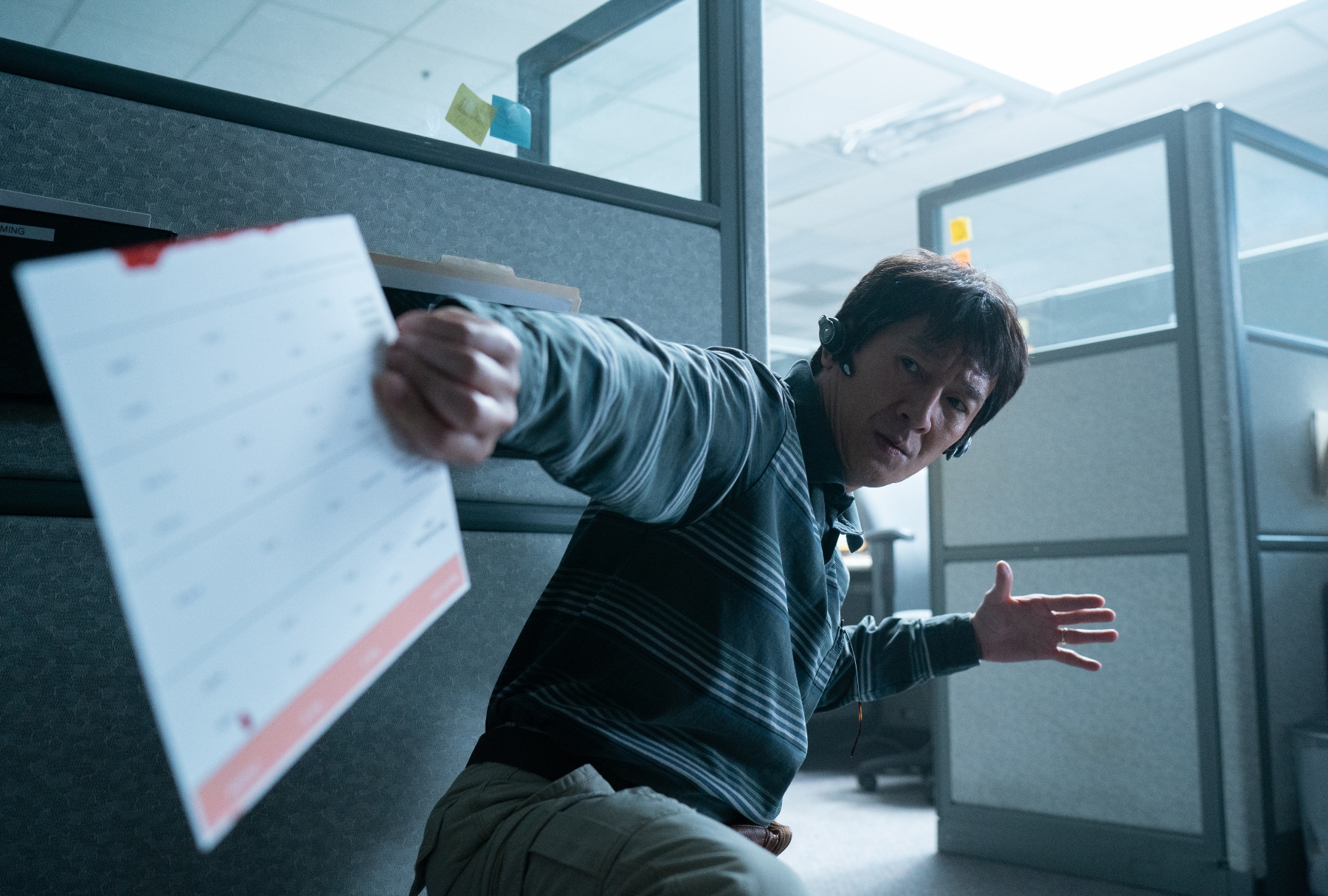 Ke Huy Quan in “Everything Everywhere All at Once” (Allyson Riggs/A24)
Ke Huy Quan in “Everything Everywhere All at Once” (Allyson Riggs/A24)
You’re Racaccoonie! One of the most fascinating things for me was all the creative actions that were needed to open up the powers [from the different universes]. The most visceral one was when Waymond had to inflict on himself the four paper cuts between his fingers. What was that list like of all the actions you brainstormed? And how did you settle on four paper cuts? Because oh my god!
Scheinert: For the longest time, there was one that was gonna be a really dusty windowsill or an AC unit, where there’s like visible dust. And we were gonna have her snort it like a line of coke. We just thought that would be pretty visceral.
Kwan: A lot of the ones that we put on the list ended up getting used in that sequence with all the Alpha jumpers, you know the person pulling the hair or like putting their finger in a socket, that kind of stuff. But with the four paper cuts, specifically, every single time that they’re supposed to be doing something absurd to jump to another universe, we were trying to come up with an analogy to a regular action movie. Like OK, what is the scene in another movie that would be doing this dramatic moment?
“We were gonna have her snort it like a line of coke.”
Scheinert: Is there one for the Chapstick? You know, there’s usually the person who just pulls out the weapon and very patiently being like, “I’ve got my plan.” That tension,
Kwan: It kind of feels like “Kingsman,” when he’s at the bar and he pulls out the umbrella. But you turn it on its head because it’s so stupid. But the paper cuts, it goes back to, there’s a scene in “No Country for Old Men” where Josh Brolin is in the river. His gun is wet, and an attack dog is about to run down the river to kill him. And so he has to take his gun apart, dry each piece out. I don’t know if you remember this, but he blows in it to try and dry it out, reassembles it. And right when the dog gets there, he shoots the dog midair. And it’s like, oh so thrilling. And so I was like, “Is there something like that. . . but dumb?” And so the papercut thing, it’s almost like loading a gun. Instead of sticking six bullets in a revolver, we’re trying to get a cut between each finger. And it’s so fun to watch an audience watch that scene. It’s so funny.
Scheinert: I have to say I was inspired to become a filmmaker by the show “Jackass,” which is so embarrassing but it looked fun to do, but also like the magic of the fact that they made feature films, I wasn’t sure if it would work. But it’s like a theater-going experience unlike any other to go see “Bad Grandpa” or a “Jackass” movie because you’re allowed to shout at the screen. In fact, you can’t help but shout at the screen. And that’s one of my favorite things about going to the theater is when you kind of embarrass yourself in front of strangers, and then you’re kind of bonded, because you cried together or laughed or screamed. That paper cut scene really is like a scene out of a “Jackass” movie.
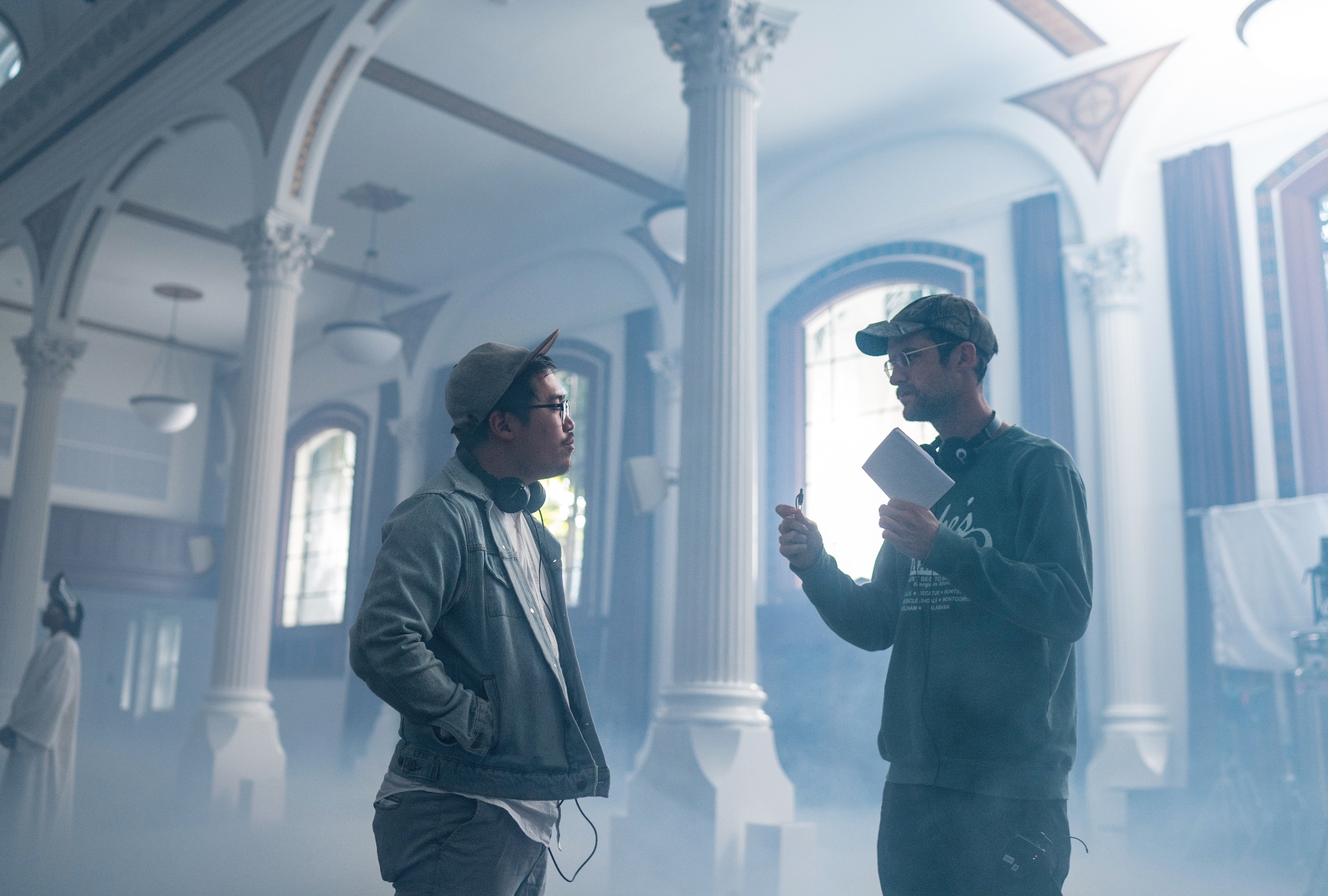 Daniel “Dan” Kwan and Daniel Scheibert on the set of “Everything Everywhere All at Once” (Allyson Riggs/A24)Last question. While I was watching, I was like, “Where’s the butts?” because I’m familiar with your older work. And we got it with the butt plug trophies and then the unexpected “verse jumping” action. Besides it just being a funny thing, what do you think it is about butts? What is it about them that’s compelling? We’re gonna do the deep dive into the rectums right here.
Daniel “Dan” Kwan and Daniel Scheibert on the set of “Everything Everywhere All at Once” (Allyson Riggs/A24)Last question. While I was watching, I was like, “Where’s the butts?” because I’m familiar with your older work. And we got it with the butt plug trophies and then the unexpected “verse jumping” action. Besides it just being a funny thing, what do you think it is about butts? What is it about them that’s compelling? We’re gonna do the deep dive into the rectums right here.
Scheinert: Yeah, I think we’re still working on it. Our next movie, we’re just gonna, we’re just gonna lean 100% in. It’s not going to be a side part of the movie. We’ll finally figure out.
Kwan: I do think people focus on the butts – but it’s all orifices. It’s everywhere, it’s the nose, it’s the eyes, it’s the mouth, it’s the ears. It is the butts, but like the butts stand out because no one else is willing to go there.
Scheinert: It’s the human experience that kind of fascinates us, like just whose quote is it, “How embarrassing to be human”? We’re all just like, “Oh, what are these weird things?” And we’re alll trying to hide it from each other and pretend like we don’t fart or pee a little when we laugh. And yet, it’s actually the thing we have in common.
Kwan: People think that the eyes are the portals to the soul but I think the butt is actually way more –
Scheinert: – vulnerable.
Kwan: Well, it’s way more vulnerable. It’s way more intimate. It’s like, there’s something about that that feels way more taboo and plays intimate. Also when you pair it with the fact that people are realizing how important like, microbial gut bacteria is to your mood and to your intelligence – it’s like, your brain and your shit are actually talking to each other.
“People think that the eyes are the portals to the soul but I think the butt is actually way more . . . intimate.”
Scheinert: There’s still so much to explore in our next movie. Our friend Felicia, her mom, when she calls her, she’s Chinese American, her mom will be like, “how are your poops?” She’s like, “Oh, I think you’re gonna be very constipated this year.” And she’s always checking in about, like, her stress levels and her poops because that’s like a very Chinese medicine thing.
I mean, Dan Kwan, you’re actually a dad now. So you’re interested in poops, right?
Scheinert: You had to get over it.
Kwan: I wouldn’t say interested, but poop is very much a part of my everyday life, yes.
“Everything Everywhere All at Once” is currently in theaters nationwide.
More stories to read:
- Turn down for butt: How the derrière took over pop culture
- “The Death of Dick Long” dares you to love the men who love Nickelback
- Ghost shops and farting corpses: How viral conceits became Trojan horses for brilliant dramas
